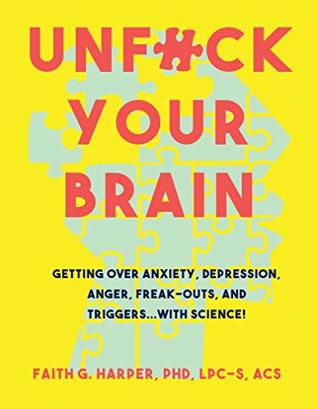More on this book
Community
Kindle Notes & Highlights
Read between
January 28 - April 11, 2020
Did something happen here that made me feel insecure? Unsafe? Unvalued? Unworthy? Unappreciated? Just plain old sad as fuck? Of all the things that have kicked me in the nuts over the years, why is this situation particularly nasty?
Human beings are hardwired for relationships. We need the stability of relationships in order to be well. Our brains know this, even when society tells us “You don’t need no one but your own DAMN SELF, playa’!” That’s some bullshit. We live communally not because we are overcrowded but because we have to do it to survive.
dealing with anger is like dealing with any other piece of information that we need to take into account to resolve a situation. It isn’t a good or bad thing and it doesn’t have to be the driving force of our decisions.
We know that substance addictions set off the pleasure pathways in the brain like WHOA…although at different levels for different people.
Gabor Maté, in his book In the Realm of Hungry Ghosts, offered this definition of addiction, which I have used ever since I read it, even in my dissertation. “Addiction is any repeated behavior, substance-related or not, in which a person feels compelled to persist, regardless of its negative impact on his life and the lives of others.
Addiction is the domain of the sensitives. The empaths. The people who notice early on what is dark, hidden, and broken in society.
If you have had a trauma, if you have been hurt so badly in a way that you don’t trust the world, you are far, far, far more likely to be susceptible to addictive behavior. At some point in most people’s lives, we start using something to help us feel better. We are hungry for something that we aren’t getting.
Instead of thinking that you have to be completely abstinent before digging into the emotional stuff, I believe that addictive behavior is a way people manage their traumas, and that we need to work on the underlying trauma and find other ways to cope with it before we take away that coping skill. Until the addiction becomes the least helpful coping skill that someone has, it’s going to be hella hard to treat.
Anxiety is a biochemical over-response to stress. Depression is the body’s way of saying nothing I do is going to help anyway, it all sucks ass no matter what. Depression is a biochemical learned helplessness response to stress.
If anger is preparing you to fight, then depression is your brain’s way of turtling up…to not get noticed, to not be too active, to not do the things that might put you in more danger. Depression is not the same thing as sadness, grief, coping with trauma, or coping with loss. Depression is the complete shutdown of all the things that make being human a joyful experience.
Part of avoiding a trauma response is having the space to grieve. Grieving what hurt you. Grieving for what you lost. Grieving the life that you wanted that isn’t the same now.
Grief scares the fuck out of us, whether it is our own or someone else’s. It feels like a freefall that is completely dark and completely bottomless.
C. S. Lewis, in his book in A Grief Observed stated: “No one ever told me that grief is so much like fear.” Grief is a realization of the certainty of abandonment. It is our worst fear made reality.
emotional pain lights up the brain the same way physical pain does. When we hurt, we LITERALLY hurt. It is just as much a bodily burden as a broken bone or serious physical illness.
Allow me the validity of being the only person who knows exactly what I’m going through at this particular moment.
your relationship with your trauma will change. It won’t be the beast that controls your every move, anymore. Your trauma will be more like that pain in the ass neighbor with too much time on their hands.


